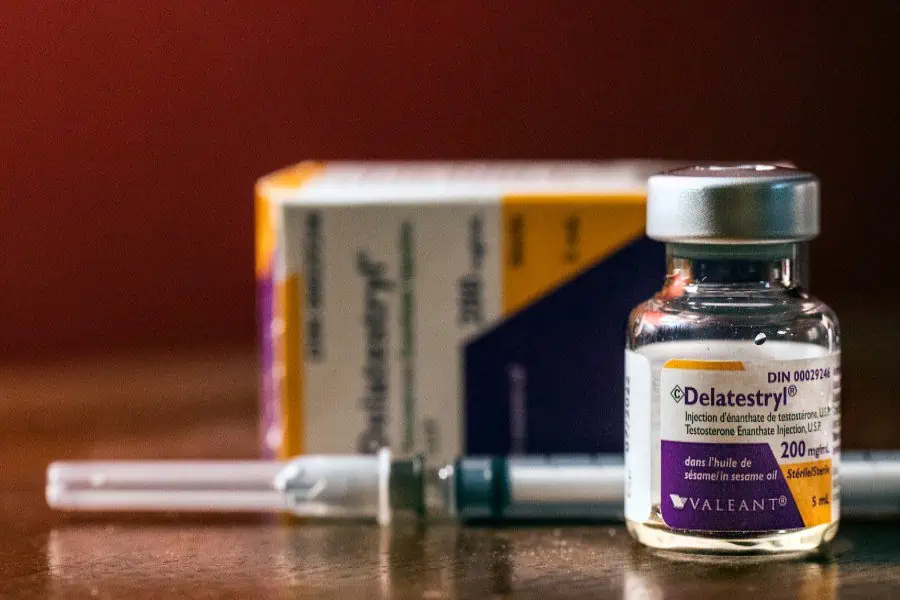
We tend to only think of testosterone as the hormone responsible for male sexual drive. While testosterone is the secret sauce that maintains libido, it’s also a hormone that has many more functions and benefits beyond sexuality—it has a huge impact on muscle and bone mass, strength and vitality, and mental acuity and health.
The body’s production of testosterone gradually slows as men age, and research has demonstrated that there is a link between declining testosterone levels and health problems associated with the aging process, including loss of muscle mass, strength, vitality and overall wellbeing.
The problem is that SCI has been shown to dramatically decrease testosterone levels in many men of all ages, including young men. Estimates of incidence range from 20 to 50 percent of men with SCI experiencing lowered testosterone (which is called hypogonadism), and it’s generally accepted that the higher and more complete the injury, the more likely it is to be present.
The results can be really debilitating, according to Dr. Stanley Ducharme, a clinical psychologist at the Center for Sexual Medicine at Boston Medical Center and a Clinical Professor of Urology at Chobanian and Avedisian School of Medicine who specializes in sexual functioning and disability.
“A loss of muscle mass and strength can affect mobility and functional independence,” Ducharme writes in an article on his website. “Fatigue, loss of energy and moodiness can ultimately impact on areas such as pressure relief, medication compliance and health maintenance. Motivation, dry skin and wound healing can also be affected if hormone levels are diminished.”
He adds that emerging evidence points to lowered testosterone levels being implicated in the presence of osteoporosis in men with SCI. And he adds that, in addition to all these issues, loss of sexual interest because of lowered testosterone can add to the existing sexual dysfunction experienced by men with SCI.
“For these individuals, sexual activities are often seen as added work or as a burden that requires additional efforts,” he writes. “Naturally, relationship or marital issues can emerge as the romantic, affectionate and intimate qualities of a relationship disappear.”
An exact cause of lowered testosterone after SCI hasn’t been identified. Although testosterone is made in a man’s testicles, the levels are regulated by another hormone called luteinizing hormone (LH) made by the pituitary gland. Some research suggests that SCI compromises the ability of the pituitary gland to produce LH.
Regardless of cause, for some men with SCI, Ducharme and other clinicians are increasingly turning to testosterone therapy for help. It’s a way of increasing testosterone levels via injections, patches or various gels.
But is it effective? And is it safe? Over the past three decades, there have been some small studies that have attempted to answer these questions. Unfortunately, these have not been well-publicized, conducted on a large scale, or resulted in any type of definitive recommendation for healthcare professionals.
Recently, a team of researchers at the University of Pennsylvania Perelman School of Medicine in Philadelphia set out to shed some light on this by completing a systematic review of existing research.
“I’m a physiatrist, or a physical medicine and rehabilitation physician,” says lead author Dr. Ryan McLoughlin. “We treat a wide variety of patients, including those with SCI, with a focus on improving function and quality of life. It’s pretty clear that people with SCI have an increased risk of developing testosterone deficiency. However, this can be overlooked. So I wanted to learn more about the benefits of testosterone therapy in those with SCI and potentially promote a treatment that could improve patient quality of life.”

As with all systematic (or scoping) reviews, McLoughlin and his collaborators first did a comprehensive search to identify credible, peer-reviewed research projects that have been completed in this area around the globe. They then summarized the findings of these projects into one comprehensive paper, which appeared on January 27, 2023, in the journal Cureus.
The title of the review is A Systematic Review of Testosterone Therapy in Men With Spinal Cord Injury or Traumatic Brain Injury. As the title suggests, the research team wanted to include traumatic brain injury (TBI), as it’s a condition where loss of testosterone also has implications. We’ll tell you right up front that the review concluded that there was insufficient evidence of any benefit for people with TBI, so we won’t further discuss that aspect of the paper. But for men with SCI, there turns out to be clear benefits—particularly when it was combined with exercise.
A total of 12 primary research studies conducted over the last 30 years made the grade for inclusion in the review. Men with SCI were investigated in 11 of these, and chronic SCI, defined as an injury older than one year, was explored in 10 out of the 11 SCI studies. The duration of clinical trials ranged from eight weeks to 18 months, and the number of participants ranged from 13 to 35. Participant age ranged from 18 to 65 years. Testosterone patches were investigated in 10 articles while one article studied testosterone gel and one article looked at testosterone injections.
The review has a couple of results that clearly stand out. First, in a 16 week study combining testosterone patches and resistance training with functional electrical stimulation (FES) in men with SCI increased their muscle mass, strength, bone quality, and basal metabolic rate while testosterone patches without exercise for 16 weeks produced no significant changes in these parameters. And in another 12-month study involving testosterone patches and maintenance of a regular diet and physical activity regime in men with SCI also increased lean tissue mass (LTM) and resting energy expenditure (REE).
No doubt, you’ve noticed that these positive results all involve exercise. “Exercise is one of the greatest things you can do for your body,” says Mc- Loughlin. “It builds muscle and bone strength, lowers the risk of disease, improves heart and brain health, and promotes healthy sleep. Unfortunately, there’s no substitute for exercise. Testosterone therapy simply allows those with low testosterone to fully maximize these benefits. A way to think about it is if you want to build a house, you need to put in the work. However, it can be easier if you have the right tools.”
As for safety, it needs to be noted that testosterone therapy is not without risks. It’s not recommended for men with evidence of prostate cancer, desire for fertility in the near future, severe sleep apnea, or severe urinary obstruction. But the review concluded that testosterone therapy was generally well-tolerated without major adverse events in any of the participants.
“Testosterone therapy with exercise,” concluded McLoughlin and his colleagues, “may help improve muscle mass, bone health, strength, energy expenditure, and cardiac health in men with SCI without major adverse effects.”
The authors point out that there were limitations in each study. Generally, study durations were short and sample sizes were small, and only one study had a placebo group. A major recommendation is made to have larger, longer and more comprehensive placebo-controlled studies to confirm benefits. We’re happy to report that an ongoing randomized, placebo-controlled trial is currently underway and is investigating the combination of testosterone injection and FES exercise versus FES exercise and placebo injection in men and women with SCI.
Also, we noted that all the studies included in the review focused primarily on physiological changes, which we asked McLoughlin about.
“You’re correct,” he says. “The studies in the review mostly focused on physical changes. In the able-bodied population, testosterone therapy has been shown to improve mood and sex drive in those with low testosterone. It’s unclear whether testosterone therapy can improve cognitive function or energy. It’s possible these benefits could apply to men with SCI. However, I think it would be worth investigating, because those with SCI represent a unique patient population.”
If you’re reading this far, you might be wondering if you’re a candidate for testosterone therapy. “Men with SCI should speak with their doctor about screening for low testosterone one year after injury—especially if they are experiencing low sex drive, depressed mood, lack of energy, and weight gain,” says McLoughlin.
Your doctor can determine if you’re deficient in testosterone with a simple blood test. If the test confirms it, you’ll likely be referred to a physiatrist, urologist or other specialist, who can better determine if testosterone therapy is the best course of action for you.
But while testosterone therapy for people with SCI seems to becoming more accepted among medical professionals, it’s important to remember that there are risks associated with testosterone therapy—again, it’s not recommended for men with evidence of prostate cancer, desire for fertility in the near future, severe sleep apnea, or severe urinary obstruction. It’s not a lifestyle enhancement or to be taken for an energy boost. Testosterone therapy is not a self-help program; it’s always conducted under careful medical supervision and requires ongoing blood monitoring. It should never be attempted by yourself.
Finally, as the systematic review makes clear, it’s a therapy that works best when combined with exercise. In fact, getting more active and eating healthier is a route that you might want to try before you pull the trigger on therapy.
“Men should optimize lifestyle changes before considering testosterone therapy, because exercise and a healthy diet alone can help improve testosterone levels,” concludes McLoughlin.
This article originally appeared in the Spring 2023 issue of The Spin. Read more stories from this issue, including:
- Smoking cessation
- Nutrition for people with SCI
- Accessible seaplane services
And more!





